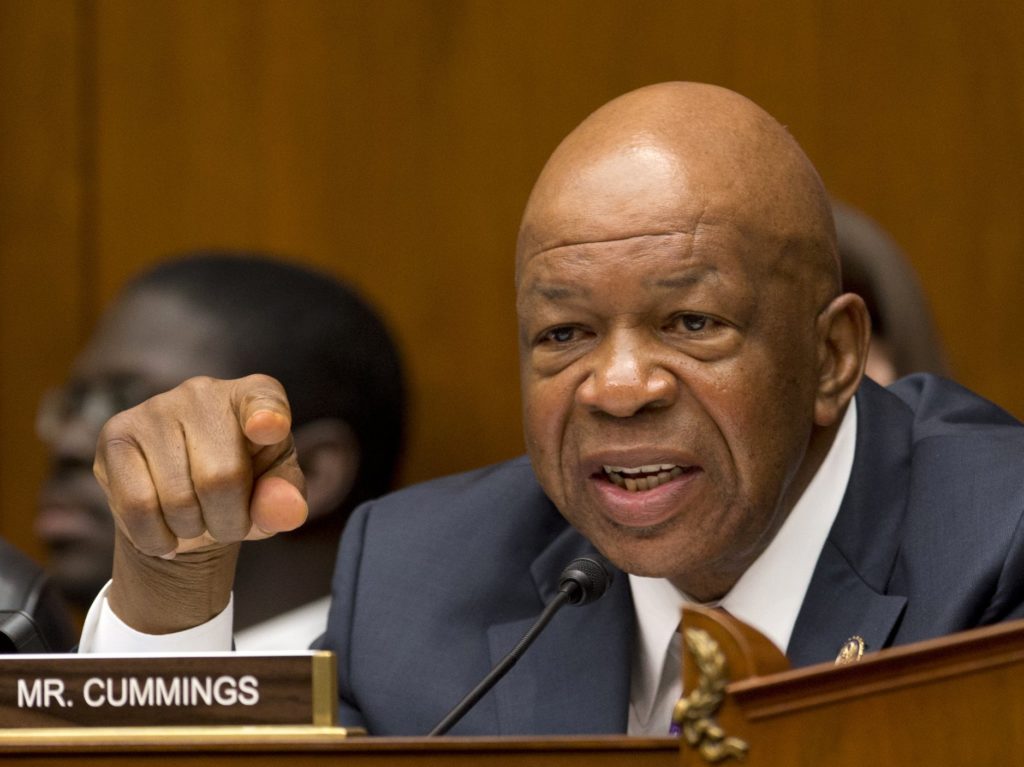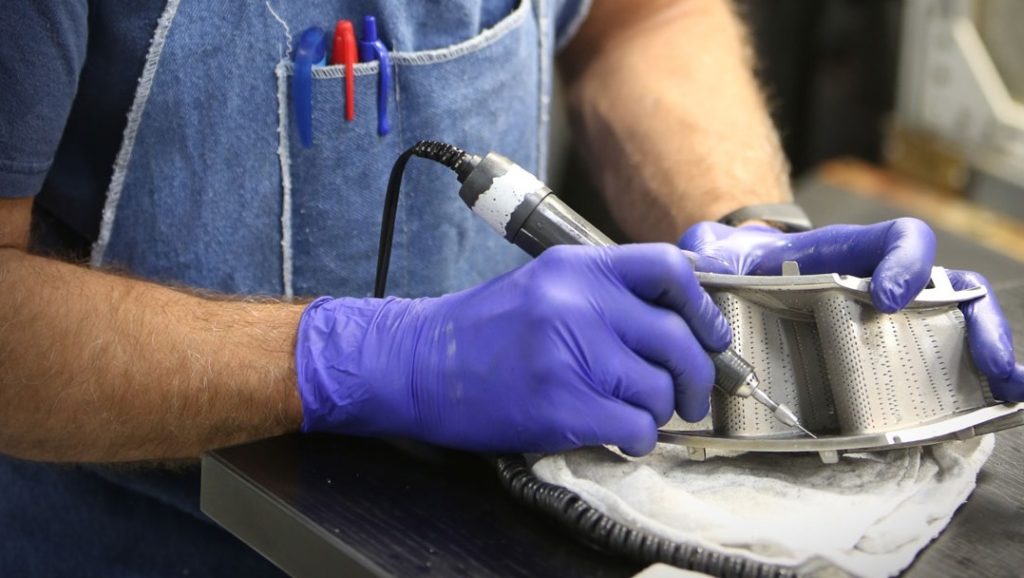China raises tariffs on US pork, fruit in trade dispute

China raised import duties on a $3 billion list of U.S. pork, fruit and other products Monday in an escalating tariff dispute with President Donald Trump that companies worry might depress global commerce. The Finance Ministry said it was responding to a U.S. tariff hike on steel and aluminum that took effect March 23. But a bigger clash looms over Trump’s approval of possible higher duties on nearly $50 billion of Chinese goods in a separate argument over technology policy. The tariff spat is one aspect of wide-ranging tensions between Washington and Beijing over China’s multibillion-dollar trade surplus with the United States and its policies on technology, industry development and access to its state-dominated economy. Forecasters say the immediate impact should be limited, but investors worry the global recovery might be set back if it prompts other governments to raise import barriers. Those fears temporarily depressed financial markets, though stocks have recovered some of their losses. On Monday, stock market indexes in Tokyo and Shanghai were up 0.5 percent at midmorning. Beijing faces complaints by Washington, the European Union and other trading partners that it hampers market access despite its free-trading pledges and is flooding global markets with improperly low-priced steel and aluminum. But the EU, Japan and other governments criticized Trump’s unilateral move as disruptive. The United States buys little Chinese steel and aluminum following earlier tariff hikes to offset what Washington says is improper subsidies. Still, economists expected Beijing to respond to avoid looking weak in a high-profile dispute. Effective Monday, Beijing raised tariffs on pork, aluminum scrap and some other products by 25 percent, the Finance Ministry said. A 15 percent tariff was imposed on apples, almonds and some other goods. The tariff hike has “has seriously damaged our interests,” said a Finance Ministry statement. “Our country advocates and supports the multilateral trading system,” said the statement. China’s tariff increase “is a proper measure adopted by our country using World Trade Organization rules to protect our interests.” The White House didn’t respond to a message from The Associated Press on Sunday seeking comment. China’s government said earlier its imports of those goods last year totaled $3 billion. The latest Chinese move targets farm areas, many of which voted for Trump in the 2016 presidential election. U.S. farmers sent nearly $20 billion of goods to China in 2017. The American pork industry sent $1.1 billion in products, making China the No. 3 market for U.S. pork. “American politicians better realize sooner rather than later that China would never submit if the U.S. launched a trade war,” said the Global Times, a newspaper published by the ruling Communist Party. Washington granted EU, South Korea and some other exporters, but not ally Japan, exemptions to the steel and aluminum tariffs on March 22. European governments had threatened to retaliate by raising duties on American bourbon, peanut butter and other goods. Beijing has yet to say how it might respond to Trump’s March 22 order approving possible tariff hikes in response to complaints China steals or pressures foreign companies to hand over technology. Trump ordered U.S. trade officials to bring a WTO case challenging Chinese technology licensing. It proposed 25 percent tariffs on Chinese products including aerospace, communications technology and machinery and said Washington will step up restrictions on Chinese investment in key U.S. technology sectors. Trump administration officials have identified as potential targets 1,300 product lines worth about $48 billion. That list will then be open to a 30-day comment period for businesses. Beijing reported a trade surplus of $275.8 billion with the United States last year, or two-thirds of its global total. Washington reports different figures that put the gap at a record $375.2 billion. Republished with the permission of the Associated Press.
Donald Trump calls for border legislation using ‘nuclear option’

President Donald Trump demanded Monday that Congress pass new border legislation using the “Nuclear Option if necessary” to muscle it through the Senate — a drastic change in rules the Republican leader has previously dismissed. Trump tweeted that the U.S. must build a border wall, but argued that “Democrats want No Borders, hence drugs and crime!” He also said that a deal to help “Dreamer” immigrants is “dead because the Democrats didn’t care or act.” Trump has previously called for the “nuclear option” — changing Senate rules to end the filibuster. But Senate Majority Leader Mitch McConnell has dismissed that option in the past, saying Republicans will welcome the filibuster if they return to being the Senate minority. The White House did not immediately answer questions about Trump’s tweets. The $1.3 trillion funding package Congress passed last month included $1.6 billion in border wall spending. But much of that money can only be used to repair existing segments, not build new sections. Congress also put restrictions on the types of barriers that can be built. Trump began tweeting over the weekend on immigration from Florida, threatening to pull out of a free trade agreement with Mexico unless it does more to stop people from crossing into the U.S. The U.S., Canada and Mexico are participating in tense negotiations over the North American Free Trade Agreement at Trump’s insistence. He also claimed that people are flowing over the border “trying to take advantage of DACA. They want in on the act!” It was not immediately clear what Trump was referring to when he said people are coming to take advantage of the program Former President Barack Obama created the Deferred Action for Childhood Arrivals program to provide temporary protection and work permits to hundreds of thousands of immigrants who are living in the U.S. illegally after being brought here as children. The Obama administration allowed signups during a set period of time, and the program is closed to new entrants. Trump ended the program last year, but gave Congress six months to pass legislation enshrining it. A deal has so far proved elusive and Trump has blamed Democrats. The Department of Homeland Security is not issuing new permits, though existing ones can be renewed. Proposed DACA deals crafted by lawmakers and rejected by Trump also were not open to new participants. Trump did not explain what he meant when questioned by reporters as he entered the Church of Bethesda-by-the-Sea for an Easter Sunday service on Sunday, but again blamed Democrats for failing to protect the “Dreamers.” “The Democrats have really let them down,” he added during the annual White House Easter Egg Roll, adding: “It’s a shame.” Trump’s comments also ignore the fact that the DACA solution he proposed mustered only 39 votes in the Senate, not enough to pass even if the Senate did approve the nuclear option. Meanwhile, the bipartisan option the White House vigorously lobbied against did gain a majority of votes, but fell six votes shy of the 60 needed to advance under Senate rules. Trump promised during the 2016 presidential campaign to build a Southern border wall to stop illegal immigration and drugs from Mexico, but Congress has frustrated him by not moving as quickly as he wants to provide money for construction. The president also complained on Twitter that border patrol agents can’t do their jobs properly because of “ridiculous liberal (Democrat) laws” that allow people caught for being in the country illegally to be released while they await a hearing before a federal immigration judge. Trump tweeted that the situation is “Getting more dangerous” and “Caravans” are coming. The president’s tweets came after Fox News’ “Fox & Friends” reported early Sunday on what it said is a group of 1,200 immigrants, mostly from Honduras, headed to the U.S. About 1,100 migrants, many from Honduras, have been marching in a caravan along roadsides and train tracks in the southern Mexico state of Oaxaca. These “Stations of the Cross” migrant caravans have been held in southern Mexico for at least the last five years. They began as short processions of migrants, some dressed in biblical garb and carrying crosses, as an Easter-season protest against the kidnappings, extortion, beatings and killings suffered by many Central American migrants as they cross Mexico. Individuals in the caravans often try to reach the U.S. border, but usually not as part of the caravan. The caravans usually don’t proceed much farther north than the Gulf coast state of Veracruz. The current march is scheduled to end this month with a conference on migration issues in the central Mexican state of Puebla, east of Mexico City. The Fox headline was “Caravan of illegal immigrants headed to U.S.” The president is known to watch the cable TV program in the morning. Brandon Judd, leader of the union representing border patrol agents, predicted on “Fox & Friends” that those in the caravan would create havoc and chaos in the U.S. as they wait for what he described as immigration reform. Judd also said Congress needs to pass tougher laws, an idea Trump appeared to echo, and create more bed space for immigration authorities to house people. Mexico routinely stops and deports undocumented Central Americans, sometimes in numbers that rival those of the United States. Deportations of foreigners dropped from 176,726 in 2015 to 76,433 in 2017, in part because fewer were believed to have come to Mexico, and more were requesting asylum in Mexico. Republished with the permission of the Associated Press.
Democrats raise ethics questions about Trump defense fund

Congressional Democrats raised ethics questions on Monday about the framework of a defense fund set up to help pay legal costs for White House, Trump campaign and transition officials caught up in investigations into Russian meddling in the election. Eighteen House Democrats claim the new defense fund appears to be structured more loosely than ones in earlier administrations. Because of the way it’s set up, the fund could receive donations from lobbyists or others with interests before the Trump administration — and also could be used to influence witnesses, the Democrats warned in a letter to David Apol, the acting director of the U.S. Office of Government Ethics. The Democrats asked the ethics office to provide records documenting communications between Wiley Rein LLP, the Washington law firm that set up the fund, and White House, Trump campaign and transition representatives. In late January, Apol told a group of Washington lawyers who set up the fund that a draft agreement of its structure appeared to be “in compliance” with federal ethics law. The ethics office, however, has not officially approved or disapproved of the structure of the fund — Patriot Legal Expense Fund Trust LLC — which has been in operation since late February. In their letter to Apol, the Democrats, including Maryland Rep. Elijah Cummings, the ranking member of the House Oversight Committee, said that while previous defense funds earmarked money for individual officials, the new defense fund “has the authority to pay money to an unlimited number of individuals, with limited disclosure requirements.” The fund was established in Delaware as a nonprofit organized under Section 527 of the U.S. tax code. That designation requires the fund to tell the Internal Revenue Service the names of all donors who donate more than $200. The Democrats claim the Patriot fund appears to allow donations by lobbyists or others with interests before the government — and could perhaps evade disclosure altogether. Despite the IRS requirement, the Patriot fund does not appear to prohibit donors giving money “on behalf of other undisclosed donors,” the Democrats said. And while Office of Government Ethics guidelines prohibit donations from lobbyists or others with governmental interests, the Patriot fund says donations for legal expenses would be banned only if the donor “indicates in writing that the contribution is being given because of an eligible recipient’s position or performance of duties.” It’s not clear from the fund’s draft how donors would be compelled to provide that information. Democrats also raised concern about the fund’s role in the possible influence of witnesses. Ethics rules ban contacts between the manager of a legal defense fund and those aided by the fund. But Democrats warned that a loophole would still let the fund manager contact Trump campaign representatives, who could, at the same time, remain in touch with fund recipients. “The agreement does not address the potential for pressure to be placed on potential recipients before they testify,” the Democrats said. “The agreement also does not prohibit communications between the manager of the fund and campaign representatives who are themselves under investigation.” A group of Wiley Rein lawyers sent a draft agreement of the Patriot defense fund to the ethics office on Jan. 29 after discussions with agency officials. The fund was officially unveiled in late February. Wiley Rein has deep expertise in election law and several partners have a history of ties to Republican administrations and the GOP. A firm member involved in setting up the defense fund declined to comment on the House Democrats’ letter. According to the draft, the fund would “be operated as a political organization,” with its donations listed in total in annual filings with the IRS. Previous defense funds, such as two 1990s-era funds for former President Bill Clinton and former first lady Hillary Clinton, had voluntary caps on the size of donations. The Patriot fund does not appear to have any limits on the size of donations. The draft explicitly says the fund was “formed to provide assistance paying legal expenses for persons involved in the investigations by special counsel Robert S. Mueller III,” House and Senate inquiries into Russia meddling and any other congressional probes. Republished with the permission of the Associated Press.
University of Alabama Honors College student takes research abroad

Alex Huechteman arrived at the University of Alabama with an idea of what she wanted to study, but the Honors College student soon discovered a path that would take her to Nicaragua to study a segment of rural population for the first time. A track and soccer athlete in high school, the Frisco, Texas, native started her academic career majoring in kinesiology with plans of physical therapy school. But during her freshman year, she became intrigued by a different medical field. “I took a chemistry class and was fascinated by anatomic-level processes and internal medicine,” said Huechteman. “I liked the challenges it presented, and I decided to switch my major to public health during my second semester.” Huechteman selected public health because she loves to talk about various areas of health care, including epidemiology and patterns of disease, among others. She also had the opportunity to research one of today’s hotly debated medical topics. “After taking several classes, I discovered I was passionate about health care systems and the politics of health care and health insurance,” said Huechteman. “I started to think about how I’m going to enter the field as a provider one day and quickly became interested in health care policy.” A clinical experience in Nicaragua When Huechteman was a sophomore and Honors College ambassador, she saw a blurb in a newsletter about the Nicaragua Clinical Experience, an Honors College program that allows UA students to learn and serve at La Clinica Alabama-Granada in Granada, Nicaragua. She immediately was intrigued because the program involved a combination of medicine, underserved communities and intercultural interaction. She was accepted into the program and lived with a host family for two weeks following her sophomore year. Huechteman’s days were split between working in the volunteer-run clinic in the morning and taking Spanish classes in the afternoon. At the clinic, she would shadow physicians, collect vital signs, monitor diabetic patients and help dispense medication in the pharmacy. “Alex excelled in patient care and interaction,” said Dr. Alyssia Miller, faculty director of the Nicaragua Clinical Experience. “She constantly looked for opportunities to interact with patients, and she truly cares for the patient as a person and sees them as more than just a sickness or treatment.” And while Huechteman enjoyed her Spanish classes, she says the time spent with her host family allowed her to fully immerse herself into the culture. “I learned more Spanish living with my host family than all of my Spanish classes combined,” said Huechteman. “I spent each day meeting vibrant, compassionate people gaining far more out of life with much less. At the close of the trip, I already knew I wanted to go back.” When she was able to apply, Huechteman quickly jumped at the opportunity to be a student facilitator, a role that normally involves assisting the program’s faculty leader with lectures and preparing students before their trip abroad, all while on campus. But not long after they were selected, Dr. Ross Bryan, assistant dean of the Honors College, gave the group of three student facilitators a rare opportunity to develop a research project and travel back to Nicaragua. “When we looked at literature about Nicaraguan health, all of the national data came from hospitals and labs in the capital of Managua,” said Huechteman. “We serve a rural population, and there wasn’t much published information about the people we see at the clinic in Granada.” An opportunity for international research Because health care information was lacking in rural communities like Granada, the group designed a community needs assessment based on a World Health Organization survey to better understand health behaviors, access to health care and demographics of patients visiting the clinic. While most of the research was qualitative, Huechteman said they added some thematic coding because most of the patients told stories. “We learned that while poverty is a big issue in the community, their needs go far beyond a problem of not being able to eat healthy foods or having access to hospitals,” Huechteman said. “They’re experiencing political issues and social support deficits as well.” According to Miller, the student facilitators were the first team to conduct international research at the Nicaraguan clinic. “Our goal is to get the information to donors and nongovernmental and missions organizations that serve the country to better allocate resources,” Huechteman said. “We want to bring awareness to the community’s needs.” Huechteman’s experiences in the Honors College and Nicaragua have not only forged a path for her future, but they will also be an inspiration for future UA Honors College students. She recently co-authored a chapter in the Honors College’s “Common Book” centered on her time abroad and dedicated to engaged scholarship and service. “My goal for college was to feel prepared for physician assistant school when I graduated. I absolutely feel I’m ready because of my time inside and beyond the classroom at UA,” Huechteman said. After graduation in May, Huechteman will enroll in the physician assistant program at the Baylor College of Medicine in Houston. She chose the program because of its emphasis on health care for Spanish-speaking populations. Republished with the permission of Alabama Newscenter.
GE Aviation managers in growing Alabama plant share training duties

Joseph Moore works days on the shop floor at GE Aviation’s fast-growing jet engine factory in Auburn – then teaches his experiences at night in the classroom. He’s one of several operations managers at GE’s Auburn site with a teaching role during the month-long vocational training sessions at Southern Union State Community College near Auburn to prepare GE’s growing roster of hourly workers About four sessions are held annually to handle the demand for more trained workers in the GE Auburn factory. In addition to the Southern Union instructors, the program includes Moore and his GE colleagues each leading a three-hour evening of instruction each week. “I really enjoy the interaction,” said Moore, who teaches lean manufacturing, Six Sigma quality practices and compliance. “Being part of the training also allows us to get a good look at the people we are evaluating for positions at the plant.” The close cooperation between GE Aviation, Southern Union and the Alabama Department of Commerce is another example of GE Aviation preparing workers for the skill sets required in its new modern factories across the U.S. “Alabama has long been a leader in workforce development, and it’s critical that we partner with industry leaders like GE Aviation to develop cutting-edge training programs like this one,” said Ed Castile, director of AIDT and deputy secretary of the Alabama Department of Commerce. “With new technologies rapidly changing how factories and other workplaces operate, our workers must be equipped with the in-demand skills to succeed in the future.” GE’s Auburn facility uses sophisticated equipment to machine advanced turbine airfoils and structural components for jet engines. Machine operators vying for positions are first trained at Southern Union with a curriculum developed by the Commerce Department’s AIDT division and by local GE plant leaders. GE Auburn produces components for the fastest-selling jet engine in commercial aviation history, the “LEAP” engine for CFM International, the 50/50 joint company of GE and Safran Aircraft Engines of France.GE is actively involved in the training process because GE Auburn is ramping up fast. Employment reached 200 people in March and is expected to grow to 280 by year’s end, according to plant manager Ricardo Acevedo. More than 14,000 LEAP engines are on back order to power three airplanes: the Airbus A320neo (soon to be made in Alabama), Boeing737 MAX and China’s COMAC C919. The Airbus and Boeing airplanes are now in airline service. The GE and Safran factories delivered 459 LEAP engines in 2017. The LEAP delivery goal is up to 1,200 engines for 2018 and in the 1,800-engine range in 2019. In addition to machining parts, the Auburn site this year will produce more than 34,000 fuel nozzle injectors for the LEAP engine using additive manufacturing machines. Auburn’s 37 additive machines is expected to grow to 45 by midyear to handle the needed higher volume. These employees require six weeks of in-house training. GE is looking at ways to engage the local community colleges in offering additive manufacturing as part of their curriculum. GE Aviation is also engaging with engineering students at Auburn University in additive manufacturing projects as part of a groundbreaking partnership. ‘Great careers’ Training for GE’s Auburn employees is not limited to community college classes. The plant also offers training in non-destructive testing in which employees become certified to evaluate jet engine components scanned in advanced X-ray machines. “There’s a skills shortage in this field,” said Tory Landry, the plant’s human relations leader. “It’s hard to find the people. We offer in-house training to candidates who can then experience a significant pay increase.” Among the factors Acevedo attributes to high retention at the plant is the GE investment in training. “There are great careers in advanced manufacturing,” he said. Over the past decade, GE Aviation has opened eight new facilities in the United States, including the new factory in Auburn and a $200 million advanced materials production center in Huntsville. Republished with the permission of Alabama Newscenter.
Bradley Byrne: Funding our government

There is no more important function of the federal government than to provide for our common defense. Unfortunately, for nearly seven years, Democrats have held funding for our military hostage, and as a result, we are facing a serious readiness crisis in our military. We have planes unable to fly and ships that cannot sail. A lack of proper resources has resulted in a loss of service-member lives and has made our country ill-prepared to face aggression from dangerous adversaries like China, Russia, and North Korea. This level of vulnerability is unacceptable. President Donald Trump signed into law H.R. 1625, the Fiscal Year 2018 government funding bill, which ensures funding for the entire federal government through September 30th. This legislation provides the resources to finally rebuild our military as President Trump and Secretary of Defense James Mattis have promised. The biggest factor in my vote for this bill was the fact that it fully funds our military after years of dangerous budget cuts that crippled our national defense. With this bill, we are finally getting the resources our servicemen and women need to keep our nation safe. I am confident in the Trump Administration’s ability to spend this money in a way that reflects our conservative priorities and rebuilds our national defense. Importantly, this bill includes many provisions important to Southwest Alabama. Specifically, the bill funds the construction of three Littoral Combat Ships and one Expeditionary Fast Transport, which are constructed right here at Austal USA in Mobile. These ships are critical in our efforts to build a fully capable 355-ship Navy fleet. The funding bill paves the way for new road projects, like the I-10 Bridge, while also ensuring resources for improvements to the Port of Mobile and necessary expansion of rural broadband initiatives. It includes strong funding levels for vital coastal ecosystem programs and makes critical investments for Alabama’s farmers and foresters. Fighting illegal immigration remains a top priority, and I am pleased to report that the bill includes $1.57 billion for physical barriers along the Southwest border and provides funding for more than 95 miles of a border wall system. The bill also increases funding for border security and immigration enforcement, putting more “boots on the ground.” Unfortunately, there are some misconceptions about the funding bill circulating online and in the national news media, and I want to set the record straight. One such claim is that the bill funds Planned Parenthood. There is not a single penny of funding for Planned Parenthood in this legislation. In fact, the bill includes the Hyde Amendment, which makes clear that no taxpayer money can be used to perform abortions. Second, the bill does not include a pay raise for Members of Congress. In fact, the bill includes a freeze in pay for Members of Congress, as it should. Third, the bill does not include any provision to restrict Second Amendment rights. It does include the Fix NICS Act, which is supported by President Trump and the NRA. The provision simply ensures that government officials put required information into the National Instant Criminal Background System (NICS). It does not expand who is ineligible to purchase a firearm or make changes to the current background check process when buying a gun. To be clear, this was not a perfect bill. I join President Trump in calling on the Senate to change the 60-vote filibuster rule to make it easier to pass funding bills that better meet our national priorities. In the meantime, I believe supporting this bill was the best option given the circumstances and the critical need to fully fund the United States military. • • • Bradley Byrne is a member of U.S. Congress representing Alabama’s 1st Congressional District.
Lawsuit again Roy Moore continues, judge refuses to dismiss

A Montgomery County judge has rejected former Alabama Chief Justice and U.S. Senate candidate Roy Moore’s request to have a defamation lawsuit against him thrown out. The judge also denied a request to move the suit to Etowah County. Montgomery County Circuit Judge Roman Shaul denied Moore’s request to dismiss the suit filed by Leigh Corfman. Corfman was one of the three women named in The Washington Post’s bombshell report back in November, during Alabama’s U.S. Senate special election, who all claimed Moore sexually pursued them when he was in his 30s and they were in their teens. Moore vehemently denied Corfman’s allegations of abuse, calling them “politically motivated,” “completely false” and “malicious.” Corfman asserted those words are defamatory in the suit she filed in January. Moore’s attorney contends Moore had a First Amendment right to defend himself. Corfman is not seeking financial compensation, only legal fees, and is looking for Moore to publicly apologize for what he has said about her. She is also seeking a court-enforced ban on Moore or his campaign that would prohibit him from allegedly criticizing her in the future. Judge Shaul also scheduled a formal court hearing in the case for Thursday, April 12.
Alabama legislator Jack Williams, ex-GOP chair Marty Connors arrested on federal bribery charges

Vestavia Hills-Republican, longtime State Rep. Jack Williams, former Alabama Republican Party Chairman Martin “Marty” Connors, along with a California-based health care executive G. Ford Gilbert were arrested Monday on federal bribery charges. “Three individuals — two of whom reside in Alabama and one who resides in California — were arrested on charges stemming from their involvement in a public corruption scheme,” said United States Attorney Louis V. Franklin, Sr. in a press release. According to the indictment, Defendant Gilbert is the owner of a California company that operates diabetes treatment centers throughout the world—Trina Health, LLC (Trina Health). In 2014 and 2015, Trina Health opened three clinics in Alabama. Soon thereafter, the state’s largest health insurer, Blue Cross and Blue Shield of Alabama (a.k.a. Blue Cross), informed Trina Health that it would not cover the treatments provided by them. Gilbert then schemed to force Blue Cross to change its position. He came up with a plan to push a bill through the Alabama Legislature’s 2016 session that would require Blue Cross to cover the treatments. Gilbert then made payments to State of Alabama House Majority Leader Micky Hammon in exchange for his efforts on behalf of the bill. Gilbert also hired Defendant Connors to act as a lobbyist on behalf of the bill. Connors knew of Gilbert’s payments to Majority Leader Hammon. Hammon and Connors then recruited Defendant Williams, the chairman of the Commerce and Small Business Committee of the Alabama House of Representatives, to hold a public hearing on the bill. Williams also knew of the payments to Hammon and acted in part to help Hammon, who, as everyone in the scheme knew, was experiencing grave financial problems. “Based on these events, the indictment charges all three defendants with conspiracy to commit bribery related to federal programs, conspiracy to commit honest services wire fraud, and honest services wire fraud,” wrote Franklin. “Additionally, the indictment alleges that Gilbert and Connors committed the substantive offense of bribery related to federal programs. Gilbert alone is charged with wire fraud, health care fraud, and interstate travel in aid of racketeering.” The indictment does not include charges against Hammon since he has already been convicted in federal court of other offenses related to mail fraud and misusing campaign funds. If convicted, the men face up to 20 years in prison. Gov. Kay Ivey weighed in on the indictment Monday afternoon following a speech in Huntsville, Ala. “There’s just no place for corruption in our great state. And so the Justice Department, the FBI, they’ve just got to go ahead and ferret out what needs to be explored because we cannot tolerate corruption,” Ivey told AL.com. “I just pointed out (during her speech in Huntsville) that the people of Alabama, the morale was very low because they had been misled by their leader and lost faith in the government. So I’ve tried my best to restore faith and trust in the government and operate an open, transparent administration.” The United States Postal Inspection Service investigated the case with the assistance of the Federal Bureau of Investigation. Assistant United States Attorneys Jonathan S. Ross and Joshua Wendell are prosecuting the case. This is a developing story and will continue to be added to.
ALGOP Chair Terry Lathan applauds Republican Caucus’ legislative accomplishments

The Alabama Legislature ended its 2018 session on Thursday after using 26 of its available 30 work days. Following the close of session, Alabama Republican Party Chairman Terry Lathan praised the Republican Caucus’ for its legislative accomplishments and “positive progress” during the 2018 legislative session. “We are proud that our Alabama Republican legislators worked so well together this session to pass legislation that will greatly benefit our state,” Lathan said in a statement. “We are thankful for Governor Ivey’s leadership in partnering with our legislature to make sure our state reaches its maximum potential. From historic middle-class tax cuts to teacher pay raises, our Republican legislators have worked hard to improve the quality of life for countless Alabamians.” Lathan celebrated the Caucus for leading the way in passing the following pieces of legislation: The first tax cut for middle-class Alabamians since 2008 The largest state education budget since 2006 A 2.5% pay raise for teachers The first state employee pay raise in a decade The Parks for Patriots Act, which welcomes Alabama veterans to state parks for no charge The Alabama Rural Broadband Act, which expands broadband services in rural Alabama The Alabama Data Breach Notification Act, which requires private companies and state agencies to report data breaches to consumers The Alabama School of Cyber Technology and Engineering to be built in Huntsville, AL The 2019 Alabama State Budget which: ‘increases funds for prisons and state troopers, and protects taxpayers by avoiding any new taxes’ “These legislative acts are an example of the many reasons we must keep a Republican majority in the state house and senate. Alabama voters will remember lower taxes, technology advances, better education and fiscally conservative budgets when they head to the polls this November,” Lathan continued. “We look forward to watching our GOP team continue to serve our citizens as they strive to make our state a better place to live and call home. As we close this chapter of 2018 and journey toward a busy election season, we will keep our vision clear and move ahead with a determination to be a party of purpose and strength.”
Proposed industrial park, community to receive $6 million

A proposed high-tech industrial park and residential community near Barber Motorsports in Alabama could receive $6 million in federal grants. The funds could help push forward development of the project that could create more than 1,200 jobs, Al.com reported. The Alabama Department of Labor says the project could generate an economic impact of more than $85 million in Birmingham. The Alabama Department of Labor announced Wednesday that the state has been given preliminary approval to distribute $10 million in federal grant funds to three projects. Work on the projects is expected to begin this summer. The project is called the Grand River Technology and Grand River Homes. The Surface Mining Reclamation and Enforcement’s federal office gave the approval. It was a part of the 2017 AML Pilot Program to revitalize Alabama’s coalfields region. Along with the Grand River development, the other projects are in the cities of Helena and Vestavia Hills. In November, the Birmingham City Council approved entering into an agreement with U.S. Steel to pay up to $4.6 million for some site work to prepare 40 acres south of Barber Motorsports Park for the industrial park. U.S. Steel will deed 24 acres near the site over to the city for the relocation of the Southern Museum of Flight. The development agreement says the city’s investment will pay for the construction of a partial road and grading of the property. U.S. Steel, Birmingham, Southern Museum of Flight, Jefferson County and Leeds has partnered on the project. Republished with permission from the Associated Press.
Women of Influence: Kristen Greenwood, Executive Director of GirlSpring

Kristen Greenwood is a woman on a mission; a mission to empower young women in Birmingham. Greenwood has been the director of GirlSpring, an online community for girls by girls, since 2016. GirlSpring was founded in 2010 by social activist and philanthropist Jane Stephens Comer. Comer realized she had the opportunity to make a difference when she attended Gloria Steinem’s 75th birthday party. Steinem challenged those in attendance to commit one outrageous act for justice, to do something that would make the world a better place. “Three months later, seven women gathered in my living room to discuss what could be done to raise awareness of gender equity and the power of women to empower each other,” said Comer. The outcome of the meeting was GirlSpring, Inc. a nonprofit organization based in Birmingham, Ala. that focuses on the issues, activities, and concerns of girls and young women. Greenwood has taken to this vision wholeheartedly, and has led the organization to new heights by launching GirlSpring’s website, the hub of the program since 2016. The website currently serves 10,000 girls, ages 13 to 18, each month. It offers resources on “tough topics” and allows girls to use their creative abilities by permitting them to submit original content for the site in the form of writing, poetry and artwork. “Girls also have the opportunity to interact by commenting and sharing content with other girls their age, so they can receive feedback and know that someone is looking at their work…Locally, we have a teen leadership group that really drives the website and is our main team of content creators. We also have public programs, such as films, lectures and seminars, that address issues relevant to girls in our target age range,” Greenwood told Style Blueprint. But Greenwood hasn’t just served girls through GirlSpring. Graduating in 1998 from the University of Alabama at Birmingham with a Bachelors of Art in Art History, and in 2006 completing her Master’s in Art History from the same school. She spent the next decade working at the Birmingham Museum of Art. Starting as a Public Programs Manager, she became an Assistant Curator of Education in 2006, and an Associate Curator of Education in 2012, a position that she maintained until Dec 2015 when she left the museum to work for GirlSpring. Greenwood has always had a heart for working with teens. At the Museum she started a program called Teen BMA; a volunteer group at the Birmingham Museum of Art that gives high school students hands-on volunteer experience, access to Museum staff and operations and opportunities to work with arts professionals. “My own preteen and teen years were difficult, and I know firsthand all of the things that teen girls have to deal with, so when I heard about this job (GirlSpring) from a friend, I knew it would be a perfect fit and that it would be something that could really make a difference in girls’ lives,” Greenwood told Style Blueprint. As Executive Director, Greenwood takes on many different roles at the organization. Not only does she engage in big picture strategy, fundraising, PR and marketing, but she also serves as a recruiter, a liaison to the organizations Springboarders, and supervises interns; only furthering her influence in these young women’s lives. Greenwood is a driven, successful and ambitious woman. In spite of her busy schedule, she managed some extra time to answer some questions from Alabama Today: How have other women influenced your success? My grandmother, Rose Cerniglia Pilato was a role model and inspiration for me. She died when I was only 11 but she was a great influence. She didn’t officially work outside the home, but she had a side business flipping houses in the 1970’s when women really didn’t do that type of thing. She had a strong work ethic, loved gardening and ate healthy before it was in style. Even though she isn’t here, I hope I am making her proud! In my career, I’ve worked with a number of women who have inspired me and whom I look up to, including the founder of GirlSpring, Jane Stephens Comer. What advice would you give young women considering careers in art history or nonprofit organizations? There are so many great opportunities in the field of art history, but it is competitive and many jobs require a PhD. I think it’s important to know that going into the field. There are not as many opportunities locally, but in bigger cities, across the U.S. and internationally, the opportunities are numerous. If it is something you are interested in as a field of study, especially as an undergrad, I would say definitely pursue it, but also use that time to learn as much as you can about the field outside of the college classroom. Intern at a museum or gallery, and read as much as you can about careers in art and art history. Art News Daily is a free email subscription and is a great way to stay informed of what’s going on in the art world, and it’s a good place to find what sparks your interest. It’s hard to know what you will be best at, but there are so many career options — curatorial work, museum education, teaching, appraising, gallery work, auction house, and many more. If you are passionate about it, you will find the right fit. The non-profit world (which includes many museums and art galleries) is very broad and there are many types of organizations, some local, some global, some huge, and some very small. If you are interested in non-profit work, know that it can be challenging as there is always a struggle to find funding, but it can also be very rewarding. I think to be good at it, you have to truly care about the mission. Non-profits can also be a way to put your professional degree to work for the greater good. There are many people I know that make good directors of non-profits because they first got their law degree or MBA and then had the skills needed to
Alabama building wins national historical renovation award

An Alabama building has won a national award as the best historical renovation under $25 million. Associated Builders and Contractors, a national trade group, announced the award to the Kress Building in Montgomery during its March convention in Long Beach, California. AL.com says developer Montgomery BUILDS turned a dilapidated three-story building into a five-story mixed-use property. The Montgomery Advertiser says several retail tenants have been signed. Official opening is April 12. Samuel L. Kress opened the building in 1898. It was rebuilt in 1929 after a fire. Republished with permission from the Associated Press.

